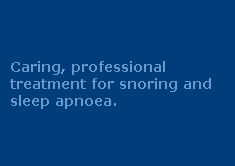Sleep Apnoea in Australia
Sleep Apnoea in Australia is extremely common, but often undiagnosed.
According to some studies, as many as 1 in 3 Australian adults suffer from some degree of sleep apnoea. In the vast majority of these cases, the sufferer is completely unaware of the existence of the condition -- becuase they are asleep when it occurs.
Sleep apnoea occurs when the soft tissue of the upper airway (particularly the tongue, soft palate, uvula and pharyngeal walls) 'collapse' into the airway as the sufferer falls asleep and relaxes. This leads to a breathing stoppage, as the soft tissues obstruct or seriously impair the normal air flow into the body.
Not surprisingly, there are a wide range of serious consequences and side effects associated with sleep apnoea. If you experience waking tiredness, daytime sleepiness, high blood pressure, slow metabolism, acid reflux, type 2 diabetes and/or snoring, there is a very high likelihood that you are suffering from this 'hidden' condition. If you are also overweight and have a large neck circumference it is almost certain you are an apnoea sufferer.
Sleep apnoea is categorised as mild, moderate or severe. A mild sleep apnoea sufferer will stop breathing for at least 10 seconds at a time (and up to 2 minutes at a time in extreme cases) between 5 and 15 times per hour while asleep. A moderate sleep apnoea sufferer will stop breathing between 15 and 30 times. A severe apnoea sufferer will stop breathing 30 or more times per hour, each hour they are asleep.
Typically, after each 'apnoeic event', the body's nervous system will wake the sufferer to get them breathing again. This is why apnoea sufferers often report waking choking and/or gasping for no apparent reason. Unfortunately, in many cases, the wakening is only a 'micro arousal', meaning the patient wakes only briefly and usually without any conscious awareness of waking. This explains why apnoea sufferers often wake feeling so tired. They may believe they've had a solid night's sleep, but the reality is they've been woken repeatedly many times per hour.
If you suspect you may have sleep apnoea, or know someone who does, call today on 1300 246 637 for a FREE, no obligation chat with a friendly treatment therapist, or complete the form below.
Whatever you do, do something! Sleep apnoea does not normally improve spontaneously. If you have apnoea you will need some form of treatment. Fortunately, sleep apnoea treatment in Australia is amongst the best in the world. A variety of treatments are available and the correct apnoea treatment will make a profound difference to your health, wellbeing and relationships.

